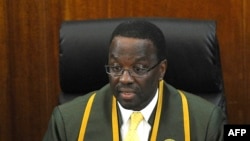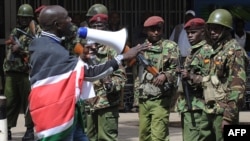NAIROBI —
Kenya’s Supreme Court ruled unanimously Saturday that Uhuru Kenyatta won this month's presidential election, striking down challenges that the vote was flawed and invalid.
Chief Justice Willy Mutunga announced the decision Saturday evening following a week of hearings.
“It is the decision of the court that the said elections were indeed conducted with compliance of the constitution and the law,” he said.
He added it is “now up to the Kenyan people ... to ensure that the unity, peace, sovereignty and prosperity of the nation is preserved.”
The ruling confirms Kenyatta's victory, which Kenya's election commission measured at 50.07 percent of the vote - enough to win the presidency outright and avoid the need for a run-off vote against the runner-up, Prime Minister Raila Odinga.
Odinga challenged the victory in the Supreme Court, alleging electoral fraud based on serious irregularities in the vote-tallying process, including instances where the number of votes cast at particular polling stations exceeded the number of registered voters.
Speaking after Saturday's announcement, Odinga said he does not agree with the judges' decision, but he wants all Kenyans to respect the constitution and accept the court's ruling.
“The future of Kenya is bright. Let us not allow the elections to divide us. Let us reunite as a nation,” he said.
There was polite applause in the prime minister's office but it was a different story outside the courthouse, where a small group of Odinga’s supporters, outraged by the ruling, rallied through the rainy streets of downtown Nairobi.
The police gave chase and fired tear gas, dispersing the crowds.
Demonstrations also broke out in the western city of Kisumu, an Odinga stronghold. A VOA reporter said four protesters were wounded in clashes with police.
Police boosted their presence across the country during the elections and have kept expanded security details in place during the past four weeks.
Many Kenyans are anxiously hoping to avoid a repeat of inter-ethnic violence that killed more than 1,100 people after the country's election in 2007.
President-elect Kenyatta and his deputy, William Ruto, are facing trial at the International Criminal Court for their alleged roles orchestrating violence.
While they come from ethnic communities who fought against each other during the violence, many of their supporters saw their alliance as a symbol of reconciliation.
Kenyatta will be sworn into office as Kenya’s fourth president on April 9.
Chief Justice Willy Mutunga announced the decision Saturday evening following a week of hearings.
“It is the decision of the court that the said elections were indeed conducted with compliance of the constitution and the law,” he said.
He added it is “now up to the Kenyan people ... to ensure that the unity, peace, sovereignty and prosperity of the nation is preserved.”
The ruling confirms Kenyatta's victory, which Kenya's election commission measured at 50.07 percent of the vote - enough to win the presidency outright and avoid the need for a run-off vote against the runner-up, Prime Minister Raila Odinga.
Odinga challenged the victory in the Supreme Court, alleging electoral fraud based on serious irregularities in the vote-tallying process, including instances where the number of votes cast at particular polling stations exceeded the number of registered voters.
Speaking after Saturday's announcement, Odinga said he does not agree with the judges' decision, but he wants all Kenyans to respect the constitution and accept the court's ruling.
“The future of Kenya is bright. Let us not allow the elections to divide us. Let us reunite as a nation,” he said.
There was polite applause in the prime minister's office but it was a different story outside the courthouse, where a small group of Odinga’s supporters, outraged by the ruling, rallied through the rainy streets of downtown Nairobi.
The police gave chase and fired tear gas, dispersing the crowds.
Demonstrations also broke out in the western city of Kisumu, an Odinga stronghold. A VOA reporter said four protesters were wounded in clashes with police.
Police boosted their presence across the country during the elections and have kept expanded security details in place during the past four weeks.
Many Kenyans are anxiously hoping to avoid a repeat of inter-ethnic violence that killed more than 1,100 people after the country's election in 2007.
President-elect Kenyatta and his deputy, William Ruto, are facing trial at the International Criminal Court for their alleged roles orchestrating violence.
While they come from ethnic communities who fought against each other during the violence, many of their supporters saw their alliance as a symbol of reconciliation.
Kenyatta will be sworn into office as Kenya’s fourth president on April 9.





